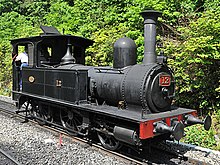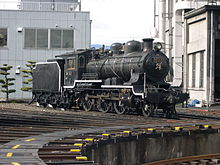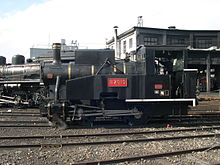List of operational steam locomotives in Japan
This is a list of preserved Japanese steam locomotives in working condition. The list includes mainline-operational locomotives, those operated on short dedicated tracks within museum premises, and locomotives awaiting overhaul to return to mainline service.
JGR/JNR standard locomotives

Most preserved JNR standard locomotives in working condition can be divided into two groups: those preserved at the Kyoto Railway Museum and those formerly preserved elsewhere but restored by railway companies from the 1980s onwards. The Kyoto Railway Museum, originally known as the Umekoji Steam Locomotive Museum, was established by the Japanese National Railways in 1972 to preserve steam locomotives in operational condition.[2] While more than 10 of the 17 locomotives in its collection were operational when it was established, this number has dwindled to 8 by 2024. Apart from B20 10 and 7105, these locomotives have remained in working condition since they were built and include the only C62 locomotive in operational condition, the largest and fastest in Japanese rail history. The museum is now owned by JR West, and two of the eight operational locomotives, C57 1 and D51 200, also haul tourist trains on the Yamaguchi Lines.[3] The latter group mainly comprises small to midsize locomotives, such as the C11, C12, C58, and C56, although JR East has restored larger locomotives such as the C61, D51, and C57.
| Type | Number | Builder | Year built | Operator | Status | Image | Notes |
|---|---|---|---|---|---|---|---|
| Class 160 | 12 (originally called 23, later 165) | Sharp, Stewart and Company | 1874 | Meiji-mura | Limited operationality | 
|
The locomotive is the sole surviving example of the class.[4] |
| Class 7100 | 7105 Yoshitsune | H.K. Porter, Inc. | 1880? | JR West | Limited operationality | 
|
Preserved at the Kyoto Railway Museum[5] |
| Class 2100 | 2109 | Dübs & Co. | 1890 | Nippon Institute of Technology | Limited operationality | 
|
The locomotive is the sole surviving example of the class.[6] |
| Class 8620 | 8630 | Kisha Kaisha | 1914 | JR West | Limited operationality | 
|
The locomotive has remained in working condition ever since it was built. It has been primarily operating on an 800-metre track within the grounds of the Kyoto Railway Museum since the 1970s.[7] |
| Class C10 | C10 8 | Kawasaki | 1930 | Oigawa Railway | Mainline operational | 
|
The locomotive is the sole surviving example of the class. The locomotive has operated on the Oigawa Line since 1997.[8] |
| Class C12 | C12 66 | Hitachi | 1933 | Mooka Railway | Mainline operational | 
|
The locomotive was restored in 1994.[9] |
| Class C56 | C56 44 | Mitsubishi | 1936 | Oigawa Railway | Awaiting overhaul | 
|
The locomotive was built for use in Hokkaido, sent to Burma during the war, brought back to Japan by railfans in 1979 and has been operating on the line since 1980. Taken out of service in 2019 and awaiting overhaul.[10] |
| Class C57 | C57 1 | Kawasaki | 1937 | JR West | Mainline operational | 
|
The locomotive has remained in working condition ever since it was built. Based at the Kyoto Railway Museum, it hauls the SL Yamaguchi service on the Yamaguchi Line together with D51 200.[11] |
| Class C12 | C12 164 | Nippon Sharyo | 1937 | Oigawa Railway and the Japan National Trust | Awaiting overhaul | 
|
The locomotive is owned by the Japan National Trust.[12] The CEO of Oigawa Railway wrote in August 2024 that he wanted to restore the locomotive to working condition in about two years.[13] |
| Class D51 | D51 200 | JGR Hamamatsu Works | 1938 | JR West | Mainline operational | 
|
The locomotive has remained in working condition ever since it was built. Based at the Kyoto Railway Museum, it hauls the SL Yamaguchi service on the Yamaguchi Line together with C57 1.[11] |
| Class C56 | C56 135 | Hitachi | 1938 | Oigawa Railway | Undergoing restoration | 
|
The locomotive was withdrawn in 1975 and preserved in Kato, Hyogo. It was purchased by the Oigawa Railway in 2022 and has been undergoing restoration since.[14] |
| Class C56 | C56 160 | Kawasaki | 1939 | JR West | Limited operationality | 
|
The locomotive was withdrawn from mainline services in 2018 and has since been operating on the 800-metre track within the grounds of the Kyoto Railway Museum.[15] |
| Class C58 | C58 239 | Kawasaki | 1940 | JR East | Mainline operational | 
|
The locomotive was estored in 2012. Its scheduled service ended in 2023 due to the retirement of carriages based at Morioka depot.[16] |
| Class D51 | D51 498 | JGR Takatori Works | 1940 | JR East | Mainline operational | 
|
The locomotive was estored in 1988.[17] |
| Class C11 | C11 171 | Kawasaki | 1940 | JR Hokkaido | Mainline operational | 
|
The locomotive never left Hokkaido during its operational life. Restored to haul excursion trains by JR Hokkaido in 1999.[18] |
| Class C11 | C11 190 | Kawasaki | 1940 | Oigawa Railway | Mainline operational | 
|
The locomotive was withdrawn from service in 1974 and preserved in a private collection until 2001. Restoration works completed in 2003 and the locomotive has operated on the line since then.[19] |
| Class C11 | C11 207 | Hitachi | 1941 | Tobu Railway | Mainline operational | 
|
The locomotive never left Hokkaido during its operational life. Restored to haul excursion trains by JR Hokkaido in 2000 and remained in operation until 2014. Since 2016, it has been leased to Tobu Railways.[20] |
| Class C11 | C11 227 | Nippon Sharyo | 1942 | Oigawa Railway | Awaiting overhaul | 
|
The locomotive was the first steam locomotive to be regularly operated for heritage purposes in Japan. It has been awaiting overhaul since 2021.[21] |
| Class C58 | C58 363 | Kawasaki | 1944 | Chichibu Railway | Mainline operational | 
|
The locomotive was restored in 1987.[22] |
| Class B20 | B20 10 | Tateyama | 1946 | JR West | Limited operationality | 
|
Used as a switcher at the Kyoto Railway Museum[23] |
| Class C11 | C11 325 | Nippon Sharyo | 1946 | Tobu Railway | Mainline operational | 
|
The locomotive was restored by Mooka Railway in 1998 and operated on the line until 2020. It entered the Tobu service in the same year.[24] |
| Class C57 | C57 180 | Mitsubishi | 1946 | JR East | Mainline operational | 
|
The locomotive was restored to haul the Banetsu Monogatari service in between Niigata and Aizu-wakamatsu in 1999.[25] |
| Class C11 | C11 123 | Nippon Sharyo | 1947 | Tobu Railway | Mainline operational | 
|
The locomotive was originally built for a private railway in Shiga as C11 1, used on Yubetsu Coal Mine Line in Hokkaido, preserved as part of a private collection until 2018. It was purchased by Tobu in 2018 and restoration completed in 2022. The number was changed to C11 123 when it entered the Tobu service.[26] |
| Class C62 | C62 2 | Hitachi | 1948 | JR West | Limited operationality | 
|
Nicknamed the Swallow Angel, the locomotive was one of the most popular ones in Japan in the 1970s. Due to its size, it has not operated on main lines since the 1970s, and has been primarily operating on an 800-metre track within the grounds of the Kyoto Railway Museum.[7] |
| Class C61 | C61 2 | Mitsubishi | 1948 | JR West | Limited operationality | 
|
The locomotive has remained in working condition ever since it was built. It has been primarily operating on an 800-metre track within the grounds of the Kyoto Railway Museum since the 1970s.[27] |
| Class C61 | C61 20 | Mitsubishi | 1949 | JR West | Mainline operational | 
|
The locomotive was restored to working condition in 2011. It is based at Takasaki together with D51 498.[28] |
Locomotives converted to run on compressed air
Since the early 2000s, multiple locomotives on display have been converted to run on compressed air instead of steam. These locomotives typically operate on short tracks. This method has been popular with small municipalities that want to create a tourist attraction but cannot afford to pay for the restoration and maintainance of boilers.
| Type | Number | Builder | Year built | Operator | Image | Notes |
|---|---|---|---|---|---|---|
| Class 9600 | 49671 | Kawasaki | 1920 | Mooka Railway | 
|
location: Mooka Station[29] |
| Class D51 | D51 146 | Nippon Sharyo | 1938 | Mooka Railway | 
|
location:Mooka Station[29] |
| Class D52 | D52 70 | Kawasaki | 1944 | Yamakita Town, railfans | 
|
location: Yamakita Railway Park, Yamakita, Kanagawa[30] |
| Class D51 | D51 827 | JGR Hamamatsu Works | 1943 | Echigo Tokimeki Railway | 
|
location:Naoetsu Railpark, Naoetsu Station (formerly Naoetsu depot)[31] |
| Class C12 | C12 167 | Nippon Sharyo | 1938 | Wakasa Railway | 
|
location: Wakasa Station
Preserved alongside a DD16 diesel locomotive and 12 Series carriages, MP from the Kyoto 2nd district, Seiji Maehara, drove this locomotive in an NTV programme in 2019. Future prime minister Shigeru Ishiba chose to drive the DD16 in the same programme.[32] |
| Class C12 | C12 244 | Hitachi | 1940 | Akechi Railway | location: Akechi Station[33]
The City of Ena has established a committee to conduct a feasibility study on restoring the locomotive, along with another C12 locomotive preserved in the city, to mainline operational condition powered by steam by the time the Chuo Shinkansen opens. The committee concluded in November 2024 that the project would be viable.[34] |
Formerly operational preserved locomotives
| Type | Number | Builder | Built | Operator | Withdrawn | Image | Note |
|---|---|---|---|---|---|---|---|
| Class C58 | C58 1 | Kisha seizo | 1938 | JNR | 1984 | 
|
The locomotive mainly operated on the Yamaguchi Line along with C57 1. This role was succeeded by C56 160. The locomotive is preserved at the Kyoto Railway Museum.[35] |
| Class C62 | C62 3 | Hitachi | 1949 | JR Hokkaido | 1995 | 
|
The locomotive returned to service in 1988. As the largest locomotive in Japanese rail history, its operation was funded by multiple corporate sponsors. However, with the onset of the Lost Decades in the 1990s, those companies could no longer support the cost of maintenance. The locomotive was withdrawn once again in 1995 and has since been preserved at the Naebo Works of JR Hokkaido.[36] |
| Class C11 | C11 312 | Nippon Sharyo | 1946 | Oigawa Railway | 2007 | 
|
The locomotive was restored in 1988 but withdrawn in 2007 due to the deteriorating condition of its boiler. It was cannibalised for parts to support other C11 locomotives operated by the company but later restored for display at a shopping centre attached to Kadode Station on the line.[37] |
| Class 8620 | 58654 | Hitachi | 1922 | JR Kyushu | 2024 | 
|
The locomotive returned to service in 1988. It was first withdrawn in 2005 but underwent a thorough overhaul and returned to service in 2009. The locomotive was retired once again in March 2024. At the time of its retirement, it was the oldest mainline-operational locomotive in Japan.[38] |
Non-JNR locomotives
| Number/name | Gauge | Year built | Builder | Original operator | Current operator | Image | Note |
|---|---|---|---|---|---|---|---|
| Amemiya 21 | 762mm | 1928 | Amemiya | Forestry Agency | Hokkaido Maruseppu Recreation Forest Park Railway | 
|
Built for Murii Forest Railway, it was withdrawn in 1957. It was given to Maruseppu town in 1976 and was restored to operate on a heritage railway to commemorate the town's wood industry the following year.[39] |
| S-304 | 1,067mm | 1932 | Nippon Sharyo | Muroran Works, Nippon Steel | Mikasa Railway Village, Mikasa city | 
|
Built for Muroran Works of Nippon Steel, it operates on the former track of the Horonai Line.[40] |
| No. 9 | 1,067mm | 1912 | Baldwin Locomotive Works | Fuji-Minobu Railway | Meiji-mura | 
|
Built for Fuji-Minobu Railway, it was later used at the Tsurumi Works of JFE Steel.[41] |
References
- ^ www.kyotorailwaymuseum.jp https://www.kyotorailwaymuseum.jp/enjoying/watching/vehicle/roundhouse-platform/. Retrieved 2024-12-30.
{{cite web}}: Missing or empty|title=(help) - ^ "梅小路蒸気機関車館の閉館について:JR西日本". www.westjr.co.jp (in Japanese). Retrieved 2024-12-30.
- ^ "SLやまぐち号公式ホームページ". www.c571.jp. Retrieved 2024-12-30.
- ^ "蒸気機関車12号・9号・三等客車 | 博物館明治村". MEIJIMURA (in Japanese). Retrieved 2024-12-30.
- ^ 産経新聞 (2018-08-25). "【文化遺産は語る(2)】北の大地走り義経として都へ 京都鉄道博物館(京都市下京区)の「SL7105号機」(1/3ページ)". 産経新聞:産経ニュース (in Japanese). Retrieved 2024-12-30.
- ^ "蒸気機関車2109号について | 展示品について | 工作機械を学ぶ工業技術博物館". museum.nit.ac.jp. Retrieved 2024-12-30.
- ^ a b "8630". 日本にある蒸気機関車 (in Japanese). Retrieved 2024-12-30.
- ^ "蒸気機関車C10形8号機 | 大井川鐵道【公式】" (in Japanese). Retrieved 2024-12-30.
- ^ "SLもおかの紹介". 真岡鐵道株式会社 (in Japanese). Retrieved 2024-12-30.
- ^ "蒸気機関車C56形44号機 | 大井川鐵道【公式】" (in Japanese). Retrieved 2024-12-30.
- ^ a b "SLやまぐち号公式ホームページ". www.c571.jp. Retrieved 2024-12-30.
- ^ "蒸気機関車C12形164号機 | 大井川鐵道【公式】" (in Japanese). Retrieved 2024-12-30.
- ^ "日本ナショナルトラスト | 大井川鐵道社長 鳥塚亮の地域を元気にするブログ". 大井川鐵道社長 鳥塚亮の地域を元気にするブログ (in Japanese). 2024-08-06. Retrieved 2024-12-30.
- ^ "C56形 135号機 ※動態化整備中 | 大井川鐵道【公式】" (in Japanese). Retrieved 2024-12-30.
- ^ "さよなら79歳のSL「ポニー」 地球を35周走ったC56形160号機、本線から引退(写真24枚) - (2)". 乗りものニュース (in Japanese). 2018-05-28. Retrieved 2024-12-30.
- ^ "C58 239の汽笛による時報が行なわれる|鉄道ニュース|2024年8月19日掲載|鉄道ファン・railf.jp". 鉄道ファン・railf.jp (in Japanese). Retrieved 2024-12-30.
- ^ "大宮工場創立130周年記念「SL D51 498の各種有料イベント」がJRE MALLに登場!". JRE MALL Media (in Japanese). Retrieved 2024-12-30.
- ^ 北海道旅客鉄道株式会社. "SL冬の湿原号". SL冬の湿原号 (in Japanese). Retrieved 2024-12-30.
- ^ "蒸気機関車C11形190号機 | 大井川鐵道【公式】" (in Japanese). Retrieved 2024-12-30.
- ^ "東武鉄道「SL大樹」をけん引するC11 207号機の経歴 | ひろやすの汽車旅コラム | 日本旅行". www.nta.co.jp. Retrieved 2024-12-30.
- ^ "蒸気機関車C11形227号機 | 大井川鐵道【公式】" (in Japanese). Retrieved 2024-12-30.
- ^ "SLパレオエクスプレスについて". 秩父鉄道 (in Japanese). Retrieved 2024-12-30.
- ^ "B20 10". 日本にある蒸気機関車 (in Japanese). Retrieved 2024-12-30.
- ^ "SL大樹 編成・車両|SL大樹をもっと知る SL大樹 | 東武鉄道". SL大樹 (in Japanese). Retrieved 2024-12-30.
- ^ "JR東日本の「のってたのしい列車」:SLばんえつ物語". のってたのしい列車 ポータル:JR東日本 (in Japanese). Archived from the original on 2024-10-02. Retrieved 2024-12-30.
- ^ "よみがえった東武のSL「C11-123」、復活までの軌跡をたどる". 鉄道コム (in Japanese). 2022-07-16. Retrieved 2024-12-30.
- ^ "C61 2". 日本にある蒸気機関車 (in Japanese). Retrieved 2024-12-30.
- ^ "蒸気機関車 C6120". www.jreast.co.jp. Archived from the original on 2020-12-22. Retrieved 2024-12-30.
- ^ a b "展示車両を紹介します。 - 真岡鐵道 SLキューロク館公式サイト". 真岡鐵道 SLキューロク館公式サイト (in Japanese). Retrieved 2024-12-30.
- ^ "D52奇跡の復活". 山北町 (in Japanese). Retrieved 2024-12-30.
- ^ "直江津D51レールパーク". www.naoetsu-d51-railpark.com. Retrieved 2024-12-30.
- ^ 日テレ鉄道部 (2024-09-27). 【鉄ちゃん石破茂・新首相秘蔵映像】地元・鳥取を走る第3セクター"若桜鉄道"(後編)政界あいのり鉄旅!鉄ちゃん"究極"の夢に初挑戦!〔日テレ鉄道部〕. Retrieved 2024-12-30 – via YouTube.
- ^ "SLの歴史 | 明知鉄道株式会社 公式ホームページ" (in Japanese). 2021-11-17. Retrieved 2024-12-30.
- ^ "SL復元検討委員会|ようこそ恵那市へ|恵那市公式ウェブサイト". www.city.ena.lg.jp (in Japanese). Retrieved 2024-12-30.
- ^ "C58 1". 日本にある蒸気機関車 (in Japanese). Retrieved 2024-12-30.
- ^ "C62 3". 日本にある蒸気機関車 (in Japanese). Retrieved 2024-12-30.
- ^ "C11 312". 日本にある蒸気機関車 (in Japanese). Retrieved 2024-12-30.
- ^ "最古のSLがラストラン 2度の引退、災害乗り越え―熊本:時事ドットコム". 時事ドットコム (in Japanese). 2024-03-23. Retrieved 2024-12-30.
- ^ "森林鉄道蒸気機関車「雨宮21号」 | 各地の北海道遺産 | 次の世代に残したい北海道の宝物 北海道遺産". www.hokkaidoisan.org. Retrieved 2024-12-30.
- ^ "展示蒸気機関車 - 三笠鉄道村". mikasa-railway.com (in Japanese). 2024-05-10. Retrieved 2024-12-30.
- ^ "愛知県・博物館明治村、100年前の蒸気機関車9号の修理完了 - 3/15に出発式". マイナビニュース (in Japanese). 2015-01-29. Retrieved 2024-12-30.
